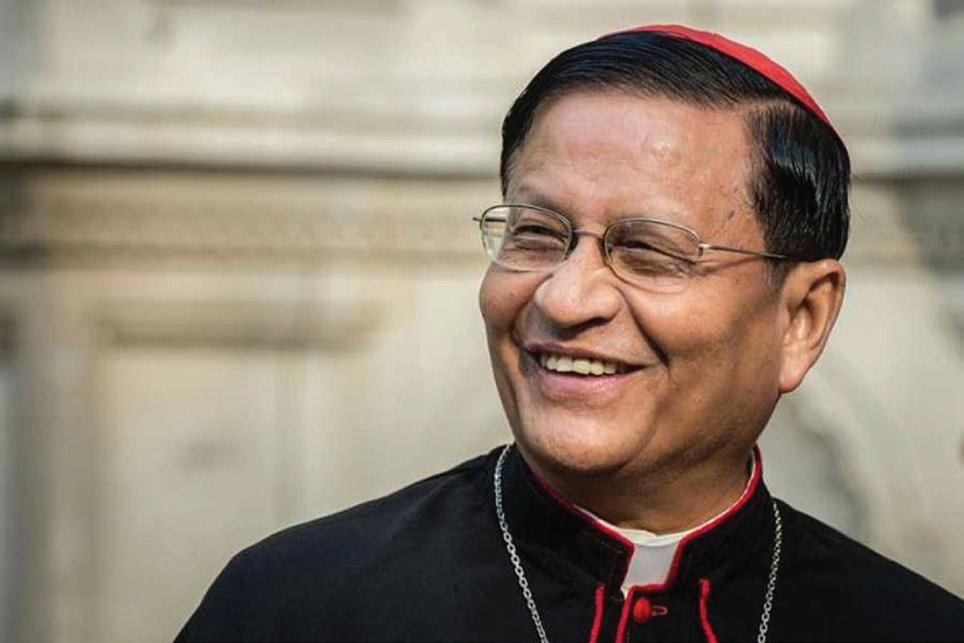
5 minute read
Be Not Afraid, Voting with a Well Formed Conscience: Diocesan Chancellor Ben Nguyen
STEVE HARVEY | UNSPLASH
Catholics and Civic Participation
Benedict Nguyen, MTS, JCL/JD, D.Min (ABD)
Chancellor for the Diocese of Corpus Christi
Throughout the history of the Church and even today, the question of how faithful Catholics can and should exercise civic participation has been an area of great interest. The Church has always called for people of faith to make Jesus Christ present in our world. In the exercise of our civic duties, we have an important opportunity to exercise a “faithful citizenship” that promotes and fosters the common good. Participation in civic and social life should continually call us and our society to a deeper examination of our values and actions, so that the dignity of every human person is recognized and respected, and a just and peaceful society can be fostered. (See Catechism of the Catholic Church, 1913-1927). This is among the important ways of living out our baptismal call and putting our Faith into action.
Neither the Catholic Church nor the Diocese of Corpus Christi intends to tell anyone how to vote by endorsing candidates or political parties. Partisan electioneering is not the goal of the Church’s teachings on political responsibility. Rather, the Church calls her members to develop a deep and continual formation of conscience.
Conscience
More than merely “feelings” or falsely justifying doing
what we please, conscience is a “judgement of reason” that allows us to check a specific action against the truth to discern whether it is right or wrong, so that we can always do good and avoid evil. (cf. CCC 1778). Conscience is a safeguard against our emotions which can so often deceive us. Since conscience equips us to consider prudentially the various complex political and social questions, true “faithful citizenship” requires that we bring to our civic involvement a conscience that is developed and well-formed.
How is this to be done?
In its document Forming Consciences for Faithful Citizenship, echoed by the Texas Catholic Conference of Bishops (TCCB)’s “Guidelines for Advocacy and Political Participation,” the Catholic Bishops offer helpful ways in which Catholics can work to form consciences in an ongoing manner as we consider the important task of participating in the political process, especially in voting. These can be summarized as follows:
First, we should pray for and accept the gifts of the Holy Spirit to help us develop our conscience. Prayer allows us to connect with God and discern the will of God. The world, even the world of politics, does not exist apart from God. He cares about us, about our society, and how we act in it. Thus, we should never forget to be in union with Him through prayer for His wisdom and guidance as we navigate our civic responsibilities. We should also always remember to pray for our civic leaders, as St. Paul exhorts us to do (see 1 Tim 2:2), that they may govern with wisdom, prudence, and justice.
Second, we should be open and committed to the truth and searching for what is right, even if this isn’t always easy or comfortable. This means that in word and deed, we must pursue the truth, acknowledge it, conform ourselves to it, and act accordingly. God has equipped each of us with a conscience. It is our duty to foster this gift so that, in light of the truth, we can more ably distinguish between what is right and wrong, what are matters of legitimate differing opinions and matters of inviolable moral principles.
Third, we should study Sacred Scripture and the Catechism of the Catholic Church. Sacred Scripture is the inspired and infallible Word of God revealed to us. The Catechism of the Catholic Church provides a clear and indispensable norm for teaching and understanding the Faith. The revelation of God as transmitted to us by the teachings of the Church, forms an essential element of the formation of our consciences. Together, these should always accompany us throughout life’s hard questions, including our political participation.
Fourth, we should examine the facts and information about various political choices. This entails the hard work of researching and familiarizing ourselves with the issues and candidates and not simply accepting the often overly rhetorical perspectives of our favorite news outlets or commentators. In our media-saturated society, it is all too easy to accept sound-bites as simplistic substitutes for true understanding of complex issues. Our duty is to do the hard work of truly and prayerfully thinking through the facts and nuances of any given issue. To assist with this, we should seek the prudent advice and good example of others who can help guide us in a rational consideration of the truth and not just in emotive reactions or partisan rhetoric.
Single-Issue Voting?
The TCCB also importantly reminds us that “as Catholics we are not single-issue voters. A candidate’s position on a single issue is not sufficient to guarantee a voter’s support. Yet a candidate’s position on a single issue that involves an intrinsic evil, such as support for abortion, may legitimately lead a voter to disqualify a candidate from receiving support.” The USCCB’s Faithful Citizenship (33-37) gives us further examples and guidance on these.
Conclusion
Finally, as we navigate the tense political climate in which we currently find ourselves, it is important for us all, whether Catholic or not, to keep in mind and put into practice the ancient saying often attributed to St. Augustine and which continues to be applicable today: “In necessary things, let there be unity; in non-essentials, let there be plurality; and in all things, let there be charity.”
Bishop Michael Mulvey and the staff of the Office for Safe Environment and Child and Family Resources are committed to assisting those who have faced abuse of any kind. For immediate assistance, support and referral information, please call Victim Assistance Coordinator Stephanie Bonilla at (361) 693-6686.










